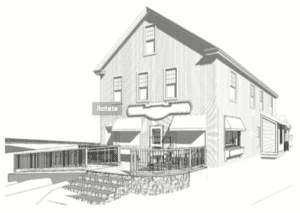By Ethan Weinstein/VTDigger
Angela and Todd Ulman never planned to buy the Taftsville Country Store. Even moving to Vermont was an unexpected decision, prompted by the pandemic. But a year after signing the initial sales agreement for the property, the biggest surprise was the ensuing bureaucratic nightmare.
When the Woodstock Planning Commission met April 14, it intended to advance the Ulmans’ effort to designate Taftsville — a hamlet of Woodstock — as a village center.
That designation, part of a state program that supports historic-center revitalization, would open up grants and tax credits to renovate the more than 180-year-old country store. To obtain it, the Ulmans needed Woodstock to alter its town plan, a change that required both the planning commission’s sign-off and Select Board-led public hearings.
Delay after delay pushed back the commission’s meeting. When it finally met on April 14, not enough members showed up to take the vote, and the Ulmans missed the state’s deadline. Taftsville cannot receive the designation until next year.
Planning commission members say it’s all a big misunderstanding.
The Ulmans fear foul play. “I’m not a conspiracy theorist or follower, but it seems fishy to me,” Angela Ulman said.
‘I left clothes in the dryer’
Angela, 38, and Todd, 44, arrived in Vermont in the summer of 2020, expecting to only stay a few weeks.

Todd and Angela Ulman moved to Vermont with their two kids in 2020.
After months holed up in Los Angeles dodging Covid, the Ulmans wanted to get away. Todd’s family has a place in Quechee, so the couple and their two kids packed up their RV and headed east.
“I left clothes in the dryer,” Angela joked.
But that summer, their two kids fell in love with Vermont. And the couple learned that they could do their job — running a post-production company for TV and movies — remotely. After finding a house in Woodstock, just up the street from the country store, they decide to stay.
Initially, the Ulmans had no plan to buy the store, which has been shuttered since 2019. The kids skied all winter and played lacrosse in the spring. Todd joined the Windsor Central School Board and helped out with Woodstock’s Economic Development Commission.
“I really was bracing for a very awkward transition,” Angela said. Her kids were used to Beverly Hills private schools. “But from day one, my kids have loved it,” she said.
When she first approached the owners of the shuttered Taftsville Country Store, the Endicott family, Angela wanted to voice her support for their business and see if she could help out. The Endicotts had run into Covid-related problems and trouble finding staff. They didn’t know if they’d be able to reopen the store as planned, Angela said.
So, the Ulmans made an offer. In May 2021, they began leasing the Taftsville Country Store with plans to buy it. They envisioned a seven-day-a-week general store, with a restaurant serving dinner and takeout.
“Our whole initiative with looking at the store was just to remedy the situation of having a vacant, boarded-up building in our community,” Angela said. “I want my kids to have pride for where they live and not drive by an empty eyesore every single day.”
‘A restaurant will certainly change this sleepy hamlet’
In July 2021, the Woodstock Planning Commission gave the Ulmans the go-ahead to start working with the area’s regional development organization to put together the village-center application.
With Two Rivers-Ottauquechee Regional Commission, the regional planning commission that includes Woodstock, Angela assembled the documents: photographs, maps and a redevelopment narrative.
According to Angela, the planning and outreach director at the Vermont Department of Housing and Community Development assured the Ulmans that the Taftsville Country Store project would be a good candidate for the state’s competitive grants. The designation would also allow them to seek state tax credits. Once Taftsville became a village center, the couple was confident they’d receive credits for $50,000 in facade improvements, as well as credits for plumbing, electrical and accessibility upgrades.

A rendering depicting the Ulmans’ plans for the Taftsville Country Store on Woodstock Road. These plans have been delayed.
Down the road, they could apply for federal historic preservation tax credits. All in all, the Ulmans hoped to receive up to $250,000 in credits and grants.
To create a village center, the town’s plan must refer to its desire to pursue this designation. First, Woodstock’s planning commission would have to approve changing the town plan, and then the Select Board would need to hold two public meetings before voting to approve the changes. Lastly, the state would give final approval to the application.
Though “village center designation” may sound like a substantial change, the move doesn’t affect zoning or taxes. Instead, it allows districts to receive tax credits designed to support revitalization, and gives the area priority in applying for state grants. The designation also allows streets near the village to apply for a neighborhood development area designation, a program that streamlines state permitting for residences.
Even so, the potential change stirred concern among some Taftsville residents.
This past March, residents assembled in the hamlet’s Mennonite church to discuss the effort. They expressed concern that the new store would bring unwanted traffic into the area and be noisy late at night.
Other residents reached out to Woodstock’s zoning administrator, Neal Leitner, directly. “I am concerned about this village designation. Additional traffic and parking that a village may create, not to mention having a restaurant, will certainly change this sleepy hamlet,” wrote Gail Childs. “I am open to change but not if it will make our taxes increase.”
‘It was devastating’
According to Peter Gregory, executive director of Two Rivers-Ottauquechee Regional Commission — which assisted the Ulmans in the application process — community hesitancy usually comes from misunderstanding.
“If there’s any community pushback anywhere, it’s from those that aren’t fully well versed in what the program is and is not,” he said of pursuing the village center designation.
Having missed the gathering of Taftsville residents, the Ulmans met with their neighbors to assuage fears. Angela said those conversations smoothed out most of the worries, and she felt confident about the future of the store.
Still, the Ulmans needed the planning commission’s blessing so that the changes in Woodstock’s town plan could move to the Select Board for approval. Angela pressed Leitner, the town’s zoning administrator, to put the village center change on the planning commission’s agenda.
But on March 31, Leitner resigned. He had worked as a liaison to the planning commission — sending agendas and Zoom links for meetings. The commission was thrust into chaos, according to member Mary Margaret Sloan.
On April 14, the planning commission was scheduled to meet. Only three of its seven members showed up.
They needed four for a quorum.
“It was devastating,” said Angela.
Because there still needed to be two additional public meetings, and each meeting required advance warning, the missed quorum pushed the project past the state’s July deadline. Now, Taftsville couldn’t receive a village center designation until next year.
“They would have definitely gotten it, and they will get it eventually,” said Gregory, head of the regional planning commission.
‘Change that can build community, not undermine it’
Reopening and running a historic general story is never easy, and owners often encounter hiccups along the way, said Ben Doyle, president of Preservation Trust of Vermont. Navigating permitting, accessing a variety of funding sources and undergoing renovations all take time and can come with unforeseen roadblocks — as the Ulmans have experienced in Taftsville.
According to Doyle, gathering community support is often crucial to completing a project involving reopening a historic building. “It’s clear that Vermonters really value general stores. They see them as part of the state’s identity and, you know, they’re community gathering hubs,” he said. “The degree to which communities can support those efforts, by making the process as transparent and as easy as possible for reopening them, I think is a good thing.”
Country stores promote the local economy by supporting nearby farmers and artisans, and serving as a space for connecting with neighbors. The pandemic brought an influx of new residents to the state, and with them comes changes to village centers, Doyle said, including businesses like the Taftsville store.
“I think there’s going to be more people coming to villages and, you know, more activity, and in some respects, that’s a really good thing for our communities and for the economy,” he said. “We’re all going to have to work together to think about how do we accommodate change, change that can build community, not undermine it,” Doyle said.
‘If we lose civility, we’ve lost everything’
The Ulmans lost their patience after that meeting. At a Select Board meeting held the following week on Zoom, Todd sent repeated messages in the chat, calling for the abolition of the planning commission.
“The planning commission doesn’t even show up for their own mtgs. They should be held accountable. Do not trust their advice on any matter until there is full transparency,” he wrote. “Abolish the planning commission and let the select board hire experts,” he continued.
After that April 22 Select Board meeting, Sally Miller, the chair of the planning commission, submitted her resignation, citing a lack of public support. The decision came following heated debate in Woodstock over allowing on-farm restaurants, which the Ulmans both supported at public meetings.
Miller did not specifically mention the Taftsville issue in her resignation, but she wrote that “some members of the community” have “shown a lack of respect for the work that the Planning Commission does.”
The Select Board later voted on May 3 to remove public chat access during meetings — a decision Todd vocally opposed.
In the wake of the missed quorum, the Ulmans have grown suspicious. “Our biggest concern is, is there nefarious intent behind all or some of the planning commission?” Angela said.
Members of the planning commission deny the accusation, citing Zoom issues, a lack of advance notice and a hectic zoning department, to explain their absence.
“I missed the meeting because I didn’t have enough notice and couldn’t change a conflicting meeting — that was true for at least several others on the planning commission,” said Mary Margaret Sloan, a commission member. “Merits of the application aside, I found the lack of civility by the proponents of the Taftsville designation in the Zoom chat at the last two Select Board meetings extremely disheartening. If we lose civility, we’ve lost everything.”
Nicholas Seldon, a planning commission member who was in attendance on April 14, called the confusion an “awful” and “unfortunate” accident.
Seldon told the Vermont Standard that, without the former zoning administrator, the commission had to create a new Zoom link at the last minute for the April 14 meeting. Plus, the commission wasn’t aware that the Ulmans would miss the state’s July deadline, and it shouldn’t shoulder the blame for their lack of tax credits, he said.
The Ulmans have until May 31 to finalize their purchase of the store. Without the tax credits, their bank pulled out of financing the project. Though they’d prefer not to, they plan to buy the property with cash, Angela said. Ultimately, she feels confident that once the country store opens, her family can put this kerfuffle behind them.
“Some are fearful of change,” Angela said. “Once we’re open, they’re going to see that our vision is something that will be a benefit to all in the community.”
The Taftsville Country Store is located at 404 Woodstock Rd, Woodstock.




